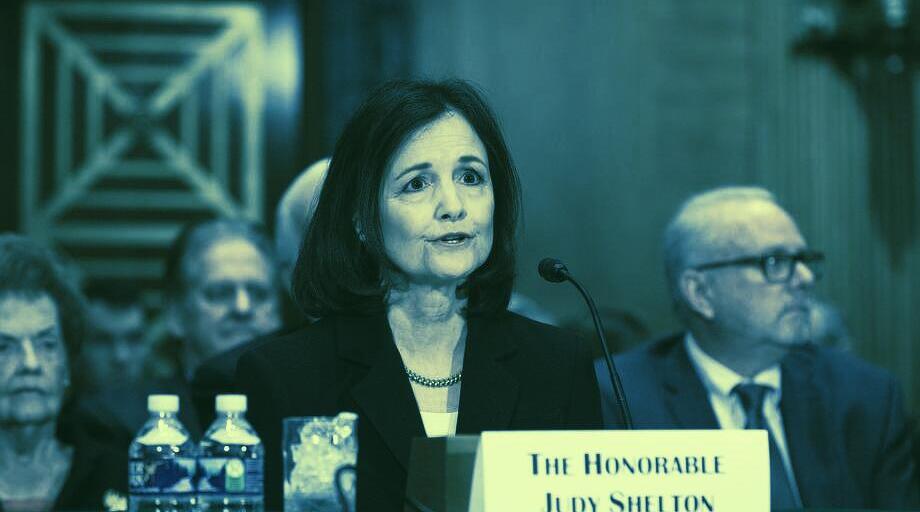And President Trump’s nominee to replace Yellen—gold standard advocate Judy Shelton—is having a difficult time getting confirmed. Her nomination failed to proceed on a 47-50 vote today.
Shelton, whose last position was as the US Director to the European Bank for Reconstruction and Development, has called for the US to return to the gold standard. That would tie the value of the dollar to actual metal rather than the price it can fetch on foreign exchange markets
Shelton’s reasons for supporting a reversal in monetary policy— President Nixon officially ended the gold standard in 1971—are directly related to inflation. In theory, because there is a limited supply of the precious metal, using a gold standard is anti-inflationary.
In a Wall Street Journal op-ed criticizing then-President Obama’s budget plan, Shelton said, “But what most Americans are concerned about…[is] the likelihood that the purchasing power of their wages and savings will be eroded through inflation. It’s small comfort to have more dollars rounding out the economy these next few years if those dollars are worth less.”
So, don’t expect Shelton to press Brrr on the Fed’s money printer.
Shelton’s ideas have a cachet in certain crypto-libertarian markets. In a 2018 paper for the libertarian Cato Institute, Shelton advocated for a common currency to maintain a “uniform value for every issued unit.” She advocated an approach “that permits the issuance of virtual currencies in tandem with government‐issued currencies, adapting legal tender laws to permit healthy currency competition.”
She reiterated that in a May interview with Gold Telegraph: “I like the idea of a gold standard—it could be used in a very cryptocurrency way. The point is do you have a unified money system so that when you talk about the international marketplace everyone is playing on a level monetary playing field?”
No surprise, then, that Shelton has proposed taking a hard look at a digital dollar.
But while inflation is a common bogeyman and crypto is gaining institutional traction, Shelton’s embrace of the gold standard puts her apart from mainstream economic thought. The St. Louis Fed writes: “The gold standard is no guarantee of price stability. Moreover, the fact that price inflation in the U.S. has remained low and stable over the past 30 years demonstrates that the gold standard is not necessary for price stability.”
Senate Republicans have tended to agree. Many have been grumbling about Shelton’s nomination since Trump put it forward. That dissent has now thinned to a handful of Senate Republicans who find her views problematic enough to block the nomination.
Mitt Romney and Susan Collins voted with Democrats against a cloture motion that would have ended debate on Shelton’s candidacy and set the stage for a final vote.
Furthermore, three Republican senators were absent: Lamar Alexander, who’s indicated he’ll vote against Shelton, was away for personal reasons; Chuck Grassley was in isolation after testing positive for COVID-19; and Rick Scott has quarantined for possible exposure to the novel coronavirus.
Senate Majority Leader Mitch McConnell also voted against the motion, a strategic move that allows him to reintroduce it later. But the legislative calendar and shifting seating arrangements are against Shelton’s appointment, unless McConnell can time a vote after Scott/Grassley return but before Arizona Democrat Mark Kelly replaces Trump appointee Martha McSally.
The vacant seat has been something of a thorn in the side of President Trump, whose initial nominee, Brookings Institution fellow Nellie Liang, withdrew her nomination in January 2019 after failing to get a Senate confirmation hearing. (Steve Moore and Herman Cain were also announced as nominees for one of the two empty Fed seats, but neither was officially nominated.)
Though Liang was praised by Fed Chair Jerome Powell, Republican senators reportedly agreed with banking industry lobbyists that she wasn’t sufficiently anti-regulation.
President Trump’s candidate for the other Fed vacancy, Christopher Waller, is having an easier time of things and has earned support from both sides of the aisle. Waller is the director of research at the Federal Reserve Bank of St. Louis.
